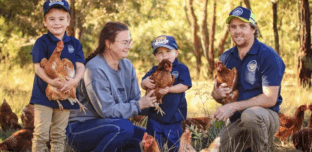From arts and crafts to jewellery design, photography, candle making, sewing, blogging and live streaming, we all have hobbies. Some of us are even prolific enough to sell the produce of our leisure time on dedicated platforms and make a few extra dollars, without thinking much of it… until it’s too late.
Income is income, and it is important to know that your hobby dollars might need reporting to the Australian Taxation Office (ATO). The line between hobby and business is thin so be sure you make it your business to know where the difference lies.
That ‘side hustle’ which you’ve had going for years could in fact be classified as a business, and you may be taxable on this income which may then result in an unexpected tax liability.
SO, WHAT IS THE DIFFERENCE BETWEEN A HOBBY AND A BUSINESS?
The distinction between a hobby and a business is generally determined by your intention and the regularity of your activity. Businesses are run with the intention of making a profit whereas an intention of making a profit is generally not the primary reason of taking up a hobby.
Generally, hobbies are conducted in your spare time as a recreational pastime, generating a minimal income and therefore not requiring you to pay taxes on the income generated. The ATO Taxation Ruling (TR) 97/11 provides some factors the ATO would consider when determining whether or not a hobby is a business:
- Profit making intention of the taxpayer;
- losses are incurred because the activity is motivated by personal pleasure and not to make a profit and there is no plan in place to show how a profit can be made;
- the transaction is isolated and there is no repetition or regularity of sales;
- any activity is not carried on in the same manner as a normal, ordinary business activity;
- the activity is carried on a small scale;
- there is an intention by the taxpayer to carry on a hobby, a recreation or a sport rather than a business;
- any product is sold to friends and relatives and not to the public at large.
| Example 1 Amy dabbles in restoring old furniture she picks up from garage sales. She spends a few hours every week on this and sells them to family, friends and people in her neighbourhood. She has always had a keen interest in furniture but does this mainly to pass her time. She does not make a significant profit from the sales, and normally sets the price of the restored furniture based on the amount she purchased it for and the amount of materials she used in restoring the furniture. Amy does this regularly through the year, but at a small scale from her garage. In this scenario, it is likely Amy is doing the furniture restoration as a hobby. |
It is important to get the distinction correct from the outset. If you are carrying on a business, it is likely expenses incurred would be deductible against any income generated. Conversely, if you incur expenses in relation to income generated from a hobby, the expenses would not be deductible to you – similarly, the income would not be assessable either.
Whichever you have, it is important to recognise this difference as there are various tax and legal implications in conducting a business. But be sure to keep an eye on your kitty, as there is a risk that if your hobby is very profitable, the ATO may regard you as carrying on business operations. In fact, it is a common scenario where a hobby can turn into a business.
| Example 2 (continued from Example 1) Amy has now realised that she is getting pretty good at furniture restoration and really enjoys it. She now scours online platforms looking for old furniture and spends considerable amounts of money in purchasing them. She has also realised that her work is so good that she should be charging a fair amount for them and once she has started doing this, she realised that she is making a decent amount of money from her “side hustle”. She knows this because she keeps a detailed spreadsheet tracking her income and expenses. In addition to this, she has also realised that her friends and family can no longer keep buying things from her so she decides to advertise herself on various social media sites such as Facebook, Instagram, Twitter etc. It is likely that the ATO would consider that Amy is now carrying on a business. |
WHEN YOUR HOBBY STARTS TURNING INTO A BUSINESS
Before you get started on your ABN and GST applications, there are a couple of things to consider:
- Running a business has significant tax and legal implications. If you are running a business, it is critical to consider all the risks you will be undertaking as a business owner.
- Business planning and tax planning would be beneficial at the outset. We have previously considered some issues start-ups should consider which can ‘make or break’ them in a previous article.
ATO’S COMPLIANCE FOCUS – SHARING ECONOMY
The ATO has significant data matching capabilities which assists them in determining whether individuals are under-reporting income in their tax returns. The Treasury Laws Amendment (2021 Measures No. 7) Bill 2021 is currently before Parliament which if enacted, will require certain transactions undertaken through electronic platforms (e.g. Airtasker, Uber etc.) to be reported to the ATO. Many Australians take part in the gig economy and it is expected that the ATO will target this area over the coming years as part of their audit/review programs. Previously, the reporting requirements were implemented for the construction industry but over the years, they have continued to expand them into more industries (e.g. IT, security, cleaning etc.), giving them enough ammunition to go hard at taxpayers not complying with their tax obligations.
MORE INFORMATION
If you would like to learn more about understanding your tax obligations for either your hobby or business, please contact your local Moore Australia advisor today.


















